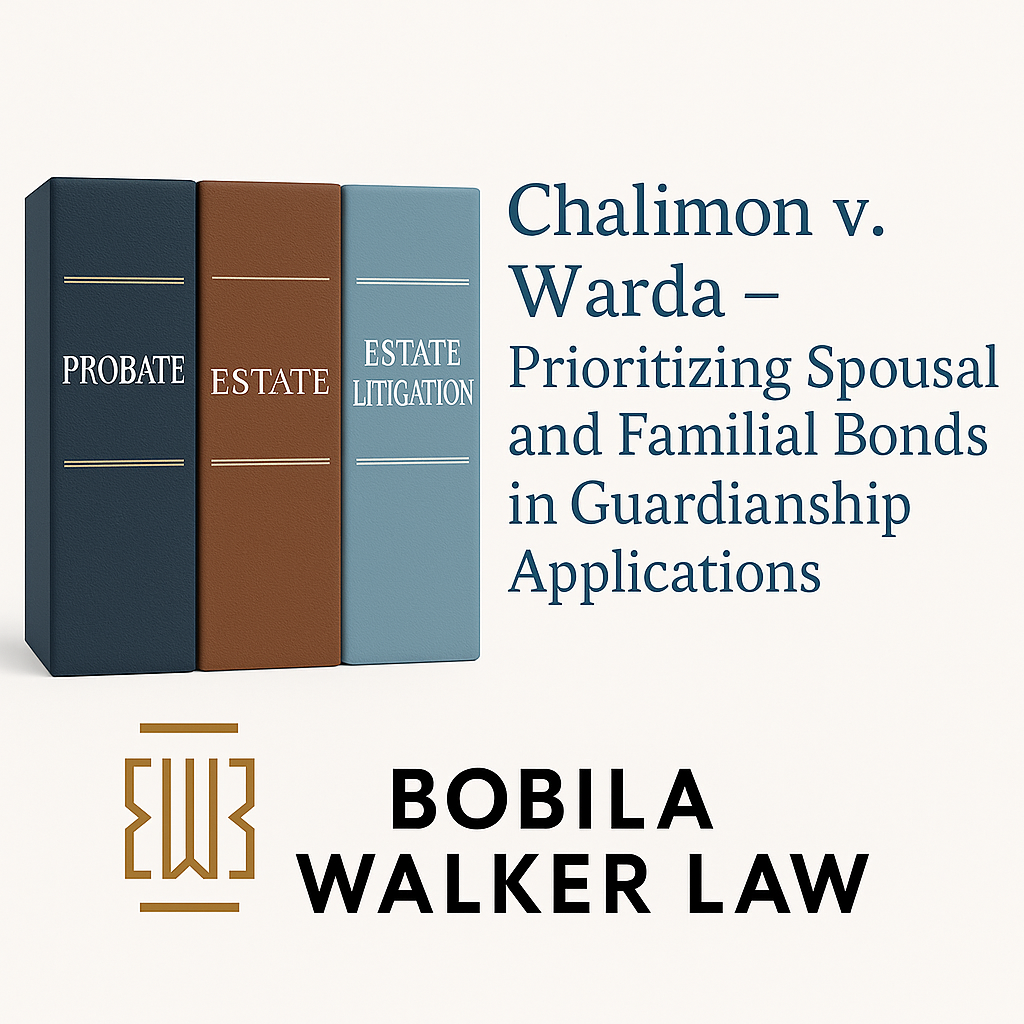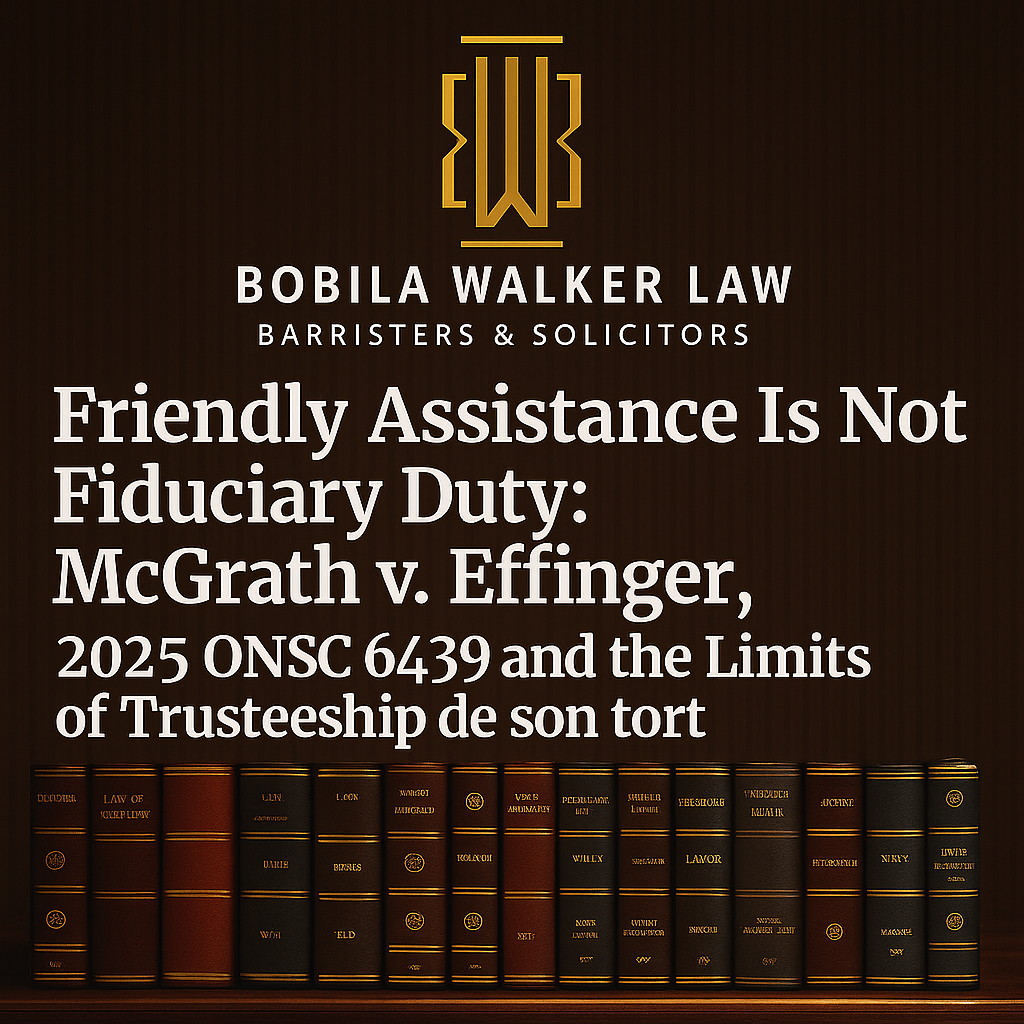Chalimon v. Warda – Prioritizing Spousal and Familial Bonds in Guardianship Applications
In the realm of estate and capacity law, guardianship decisions often hinge on delicate family dynamics, legal criteria, and the best interests of the incapable person. A recent ruling from the Ontario Superior Court of Justice, Chalimon v. Warda, 2025 ONSC 5776, released on October 10, 2025, provides valuable insights into how courts evaluate competing claims for guardianship under the Substitute Decisions Act, 1992 (SDA). This case underscores the importance of relational closeness, potential conflicts of interest, and evidence-based assessments when appointing guardians for property and personal care.
Case Background: A Family Dispute Over Guardianship
The case centers on Fouaad Warda, a 51-year-old man who suffered a series of debilitating strokes in August 2020, rendering him incapable of managing his property or personal care. Mr. Warda, who emigrated from Syria to Canada in 1990, had been married to Nanson Chalimon since 1999. The couple shared a home in Maple, Ontario, and had two children: a daughter, Bianca (born 2003), and a son (born 2008).
Following Mr. Warda’s incapacity, Ms. Chalimon applied to be appointed as his guardian for both property and personal care under sections 22 and 55 of the SDA. Later, she proposed that her daughter Bianca join her as a joint guardian. This application was opposed by Mr. Warda’s siblings (Zaki, Jargis, Zakia, Lora, Georgette, and Manna) and his mother, Mariam Warda-Hanna, who sought to have Zaki Warda appointed instead.
The parties agreed that Mr. Warda was incapable – confirmed by capacity assessments in 2022 – but disagreed sharply on who should manage his affairs. Key assets included:
- A jointly owned family home on Canyon Gate Crescent, valued at approximately $1 million with a $215,000 mortgage.
- Proceeds from a condominium investment ($28,415.94 paid into court following an interim order).
- A disputed interest in a property on Cromwell Road, co-owned with Jargis Warda’s wife, valued at $1.2 million with a $189,000 mortgage.
The court heard the matter on August 5, 2025, with Justice R.E. Charney presiding.
Key Issues and Court Analysis
Under sections 24(5) and 57(3) of the SDA, courts must consider specific criteria when appointing guardians, including:
- Whether the proposed guardian is an attorney under a continuing power of attorney (not applicable here).
- The incapable person’s current wishes (which could not be ascertained due to Mr. Warda’s condition).
- The closeness of the relationship between the applicant/proposed guardian and the incapable person.
Justice Charney emphasized that while the SDA does not explicitly prioritize family members, the spouse and daughter who lived with Mr. Warda prior to his stroke were deemed to have a closer relationship than his brother. This was evidenced by their shared residence, joint economic unit, and ongoing family life.
Addressing Allegations of Estrangement
The opposing family members alleged that Ms. Chalimon and Mr. Warda were “estranged,” citing hearsay from friends about domestic arguments and financial disagreements. However, the court dismissed these claims as “flimsy,” noting that minor bickering is common in long-term marriages and does not equate to separation or estrangement under family law principles. The judge preferred the evidence from Bianca, who lived with both parents and attested to their close family unit.
Conflict of Interest: The Cromwell Road Property
A significant factor was the dispute over the Cromwell Road property. Zaki Warda claimed Mr. Warda had been paid $75,000 for his interest in 2008, but Ms. Chalimon disputed this. The court found this created a clear conflict of interest for Zaki, disqualifying him as guardian. Justice Charney noted that carving out specific assets from guardianship would complicate matters unnecessarily and that money’s fungible nature could indirectly affect the entire estate.
Caregiving Disputes
There were conflicting claims about who provided care at Mr. Warda’s long-term care home. Ms. Chalimon submitted letters from staff confirming her frequent visits and status as a Designated Essential Caregiver. In contrast, Zaki claimed to administer insulin personally, but this was contradicted by the home’s administrator, who testified that only nursing staff could do so. The court resolved these disputes in favor of Ms. Chalimon and Bianca, highlighting their dedication.
Procedural Notes
The court allowed Bianca’s late addition as a joint guardian, prioritizing Mr. Warda’s best interests over strict procedural adherence. It also dispensed with the guardianship bond requirement due to limited resources, but prohibited selling the family home without approval from the Public Guardian and Trustee (PGT) or the court.
The Court’s Decision and Orders
Justice Charney granted the application, appointing Ms. Chalimon and Bianca as joint guardians for property and personal care. Key orders included:
- Declaring Mr. Warda incapable and requiring decisions on his behalf.
- Requiring revised management and guardianship plans as joint guardians.
- Mandating account passing every two years.
- Allowing the guardians to act as litigation guardians (with exceptions).
- Awarding costs to the applicants from Mr. Warda’s property on a full indemnity basis.
This ruling reinforces that courts will favor immediate family members with proven closeness and no conflicts when possible.
Implications for Guardianship Law in Ontario
Chalimon v. Warda serves as a reminder of the SDA’s focus on relational proximity and the incapable person’s best interests. It highlights:
- Evidence Matters: Courts scrutinize hearsay and prefer direct testimony from those closest to the situation.
- Avoiding Conflicts: Potential financial disputes can disqualify otherwise suitable candidates.
- Family Dynamics: Long-term cohabitation and shared economic ties weigh heavily in favor of spouses and children.
- Flexibility in Procedure: Late amendments may be allowed if they serve the core purpose of protection.
For families dealing with incapacity due to illness, injury, or aging, this case illustrates the need for early planning, such as powers of attorney, to avoid contentious court battles.
To discuss your guardianship matter, please contact us at 416-847-1859 or email our Managing Partner at daniel@bobilawalkerlaw.com





